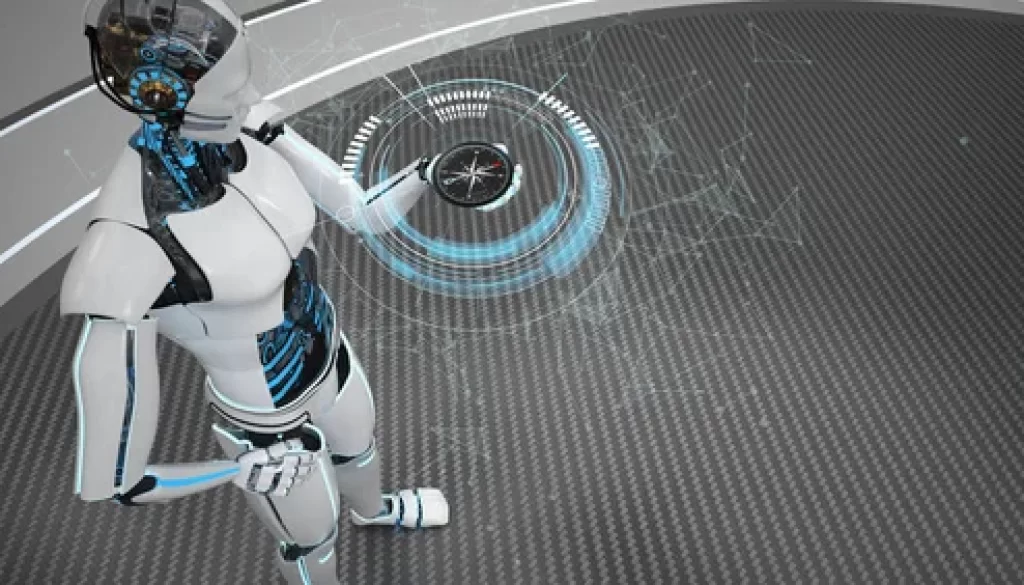Artificial Intelligence Ultimate Guide
Introduction
In the continually shifting realm of technology, one domain that commands exceptional attention is Artificial Intelligence (AI). This avant-garde technology has borne witness to exponential expansion and is progressively assimilating into our daily existence. In this exhaustive compendium, we shall plunge into the intricate aspects of Artificial Intelligence, illuminating its applications, evolutionary trajectory, and its profound impact on diverse sectors. Lets explore “Artificial Intelligence Ultimate Guide”.!!
What is Artificial Intelligence?
Artificial Intelligence, or AI for brevity, signifies the replication of human cognitive capacities within machinery, capacitating them to execute tasks that conventionally demand human acumen. AI encompasses an extensive spectrum of proficiencies, comprising learning, rationale, predicament resolution, sensory acumen, and linguistic comprehension. It revolves around the creation of machinery capable of emulating human intellectual functions.

The Evolution of AI
Early Beginnings
The genesis of AI can be traced back to antiquity when human reveries revolved around engendering mechanisms with human-like aptitudes. Nonetheless, the inception of AI, as we now recognize it, only transpired in the mid-20th century. Alan Turing, a British mathematician, was instrumental in laying the groundwork for AI with his conception of a hypothetical computational apparatus, presently acknowledged as the “Turing machine.”
AI Milestones
The evolution of AI is delineated through several momentous milestones:
The Dartmouth Workshop (1956): This juncture marked the birth of AI as an academic discipline. It was here that John McCarthy coined the phrase “Artificial Intelligence.”
Cognoscente Systems (1960s-1970s): This epoch witnessed the formulation of AI systems that could replicate human expertise in distinct domains.
Cerebral Learning (1980s-1990s): The epoch saw the ascension of cerebral learning algorithms, a pivotal component of AI.
Profound Learning (2010s): Profound learning, a subset of cerebral learning, transformed AI through neural networks and sophisticated algorithms.
AI Today and Tomorrow: In recent years, AI has achieved notable breakthroughs in fields such as computational vision, natural language processing (NLP), and robotics. The future holds the promise of even more exceptional advancements, encompassing AI systems capable of continuous learning and adjustment.
Applications of Artificial Intelligence
AI has discovered application across sundry industries, revolutionizing our lifestyles and professions. A few salient applications are:
Healthcare
AI is augmenting medical diagnoses, pharmaceutical exploration, and individualized therapeutic strategies. Machine learning models scrutinize patient data to proffer more precise and punctual healthcare resolutions. AI-infused telemedicine interconnects patients with remote healthcare providers, assuring access to medical adeptness, notably in underserved zones.
Read more about AI in Healthcare: The Power of Artificial Intelligence in Healthcare
Finance
In the fiscal domain, AI is deployed for algorithmic trading, fraud detection, and credit jeopardy evaluation. It furnishes instantaneous data analysis and decisional backing. AI-propelled robo-advisers are amassing traction, bestowing automated investment tactics customized to idiosyncratic financial aspirations.
Retail E-commerce behemoths harness AI for personalized commendations, stockpile administration, and client service automata, enhancing the shopping encounter. AI-anchored automata assist clients around the clock, supplying expeditious ripostes to inquiries and aiding in product preference.

Transportation
Self-driving automobiles, energized by AI, are revamping the conveyance domain. These conveyances employ sensors and advanced algorithms for navigation and on-road verdict making. AI’s function in optimizing traffic progression and curtailing congestion is gaining paramount importance.
Education
AI is deployed for tailored edification, adaptable appraisals, and even the mechanization of managerial duties, rendering education more accessible and efficient. Adaptable edification platforms employ AI to tailor scholastic content to the individual requisites of learners, augmenting edification outcomes.
Amusement
AI plays a substantial part in content endorsement and origination. Streaming platforms leverage AI algorithms to proffer motion pictures and music grounded on user inclinations. Furthermore, AI is employed in video game blueprint, crafting immersive and adaptable gaming experiences. AI-fashioned art and music are also attaining recognition in the creative sphere.
Manufacturing
In manufacturing, AI-driven mechanization is rationalizing production procedures, enhancing efficiency, and ensuring unwavering product quality. Automatons furnished with AI can manage intricate errands on assembly lines, culminating in heightened precision and productiveness. Prognostic conservation energized by AI trims downtime and upkeep expenses.
The Future of Artificial Intelligence
As AI persistently advances, its outlook appears propitious. Here are several key trends and quandaries to be mindful of:
1. Natural Language Processing (NLP)
NLP empowers machines to comprehend and engender human language. This technology is progressing at an accelerated pace, with applications in automata, paraphrase amenities, and content origination. AI-driven automata are becoming progressively sophisticated, furnishing natural and efficient dialogues for customer service and reinforcement. Multilingual automata are becoming more prevalent, allowing enterprises to engage with a global audience.
2. Ethical Concerns
The growth of AI begets moral dilemmas such as data confidentiality, partiality in algorithms, and job replacement. Addressing these predicaments will be vital for the conscientious development of AI. Legislators and tech corporations are collaborating to frame rules and ordinances for ethical AI use. The notion of AI morality is expanding, subsuming matters such as clarity, accountability, and algorithmic justice.
3. AI in Research

AI is evolving into a potent instrument in scientific investigation, from pharmaceutical exploration to environmental modeling. It expedites the cadence of originality and trouble-shooting. Investigators are harnessing AI to scrutinize voluminous datasets, effectuating groundbreaking revelations in realms such as genomics, climatology, and materials research. AI-endowed simulations are expediting research in intricate and data-intensive realms, such as astrophysics and quantum calculation.
4. Autonomous Systems
AI is catalyzing the progression of self-reliant systems, ranging from self-driving vehicles to unmanned aerial conveyances. These systems possess the potential to transform industries, heighten safety, and diminish human involvement in perilous tasks. Self-reliant transport drones and automata are reshaping logistics and distribution services. The epoch of self-reliant conveyances is progressively actualizing, promising more dependable and effective transportation.
5. Healthcare Revolution
AI is poised to revolutionize healthcare. Prescient examination, wearable apparatuses, and telemedicine are all domains where AI is anticipated to exert a substantial influence. It will empower early disease detection, tailored therapeutic strategies, and more available healthcare facilities. AI-fueled wearable devices can unceasingly monitor vital signs and proffer real-time health insights. Telemedicine platforms extend on-demand virtual medical consultations, rendering healthcare more accessible, chiefly in remote regions.
Conclusion to Artificial Intelligence Ultimate Guide
Artificial Intelligence is a vibrant arena with far-flung implications across myriad industries. This extensive handbook has dispensed a profound insight into AI’s evolution, applications, and its impending course. As AI persists in configuring our world, keeping abreast of its advancements is not only a prerogative but an essential requisite.
Additional Links
FAQs
1. What is Artificial Intelligence (AI)?
- AI refers to the simulation of human intelligence in machines, enabling them to perform tasks that typically require human cognitive abilities. These tasks include learning, reasoning, problem-solving, perception, and language understanding.
2. How has AI evolved over the years?
- AI has a rich history that dates back to ancient times when humans dreamed of creating machines with human-like abilities. However, the modern concept of AI took shape in the mid-20th century. Alan Turing’s theoretical computing machine and the Dartmouth Workshop in 1956 played pivotal roles in its evolution.

3. What are the applications of AI?
- AI has found applications in various industries, including healthcare, finance, retail, transportation, education, entertainment, and manufacturing. It is used for medical diagnosis, financial analysis, self-driving cars, personalized learning, content recommendation, and more.
4. What are some notable advancements in AI today?
- In recent years, AI has made significant strides in areas like computer vision, natural language processing (NLP), and robotics. Notable advancements include AI-driven telemedicine, sophisticated chatbots, and self-driving cars.
5. What are the key trends and challenges in AI’s future?
- The future of AI holds trends such as Natural Language Processing (NLP) development, ethical concerns regarding data privacy and bias in algorithms, AI’s role in scientific research, autonomous systems, and its transformative impact on healthcare.
6. How is AI used in healthcare?
- AI is revolutionizing healthcare by enhancing medical diagnoses, drug discovery, and personalized treatment plans. It also supports telemedicine, wearable devices for continuous health monitoring, and early disease detection.
7. What ethical concerns surround AI?
- Ethical issues in AI include data privacy, bias in algorithms, and the potential displacement of jobs due to automation. Policymakers and tech companies are working to create guidelines and regulations for responsible AI usage.
8. How is AI applied in the finance sector?
- AI is used in finance for algorithmic trading, fraud detection, and credit risk assessment. Robo-advisors, powered by AI, offer automated investment strategies tailored to individual financial goals.
9. What is the role of AI in education?
- AI is employed in education for personalized learning experiences, adaptive assessments, and automating administrative tasks. It tailors educational content to individual student needs, improving learning outcomes.
10. What is the significance of AI in the entertainment industry?
- AI plays a substantial role in content recommendation and creation, particularly in streaming platforms. It is also used in video game design, generating art and music, and creating immersive gaming experiences.
MCQs
1. What does AI stand for?
- A) Advanced Innovation
- B) Artificial Intelligence
- C) Automated Intelligence
- D) Augmented Information
- Answer: B) Artificial Intelligence
2. When did the modern concept of AI begin to materialize?
- A) Ancient Times
- B) 19th Century
- C) Mid-20th Century
- D) Early 21st Century
- Answer: C) Mid-20th Century
3. Which British mathematician played a pivotal role in laying the foundation for AI?
- A) Isaac Newton
- B) Charles Babbage
- C) Alan Turing
- D) Stephen Hawking
- Answer: C) Alan Turing
4. What does NLP stand for in the context of AI?
- A) Natural Language Processing
- B) Neural Learning Process
- C) Networked Language Protocol
- D) New Linguistic Program
- Answer: A) Natural Language Processing
5. In which industry has AI made significant advancements in computer vision and robotics?
- A) Agriculture
- B) Construction
- C) Healthcare
- D) Fashion
- Answer: C) Healthcare
6. What are some ethical concerns related to AI?
- A) Job Creation
- B) Data Privacy and Bias
- C) Resource Allocation
- D) Technological Advancement
- Answer: B) Data Privacy and Bias
7. How is AI used in the financial sector for investment strategies?
- A) Algorithmic Trading
- B) Genetic Engineering
- C) Social Media Marketing
- D) Environmental Conservation
- Answer: A) Algorithmic Trading
8. What role does AI play in education to enhance learning outcomes?
- A) Automating Administrative Tasks
- B) Offering Financial Aid
- C) Creating Artistic Content
- D) Promoting Physical Fitness
- Answer: A) Automating Administrative Tasks
9. In which industry does AI provide content recommendation and creation?
- A) Agriculture
- B) Music Production
- C) Streaming Services
- D) Automotive Manufacturing
- Answer: C) Streaming Services
10. How does AI contribute to manufacturing processes?
- A) It handles customer support.
- B) It enhances artistic creativity.
- C) It streamlines production and improves efficiency.
- D) It provides financial advice.
- Answer: C) It streamlines production and improves efficiency.




December 6, 2023 @ 3:22 pm
Pretty nice post. I just stumbled upon your weblog and wished
to say that I have really enjoyed browsing your blog posts.
In any case I’ll be subscribing to your feed and I hope you
write again soon!